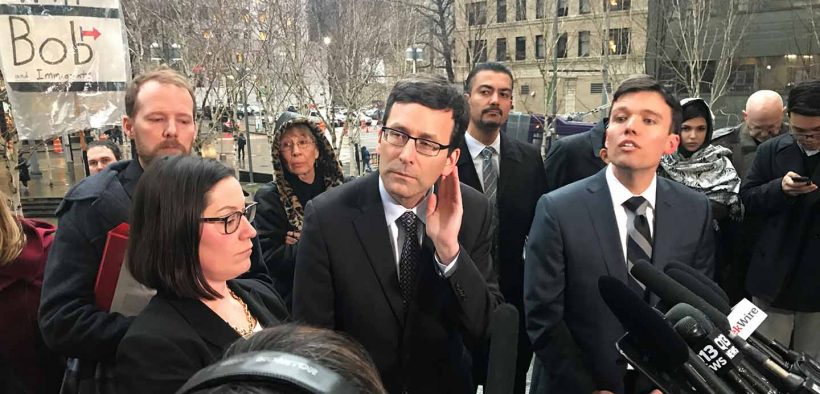Sheriffs who don’t Enforce Washington’s New Gun Law could be Liable, Attorney General Says

Washington Attorney General Bob Ferguson on Tuesday said County Sheriffs who deny enforcing Washington’s new, stricter gun laws could be held liable if they refuse to perform enhanced background checks and someone who shouldn’t buy a gun is able to buy one and uses it in a crime.
In an open letter to law enforcement, Ferguson wrote that he was confident the wide-ranging law was constitutional and would be able to withstand court challenges, but that he was concerned about threats — mostly from county sheriffs — to not enforce the new law.
As per some recent reports, at least 13 Sheriffs have said that they would not enforce the law, Initiative 1639, which the State voters passed with a huge majority in November.
The law raises the minimum age to buy semi-automatic rifles, requires enhanced background checks for those rifles and can hold gun owners responsible if their gun was stored carelessly and is used in a crime — has not yet gone into effect. As of now, only the higher age limit — raised from 18 to 21 — is now in effect; the rest of the law goes into effect July 1.
In November, going against the law, the NRA and the Second Amendment Foundation sued Ferguson and the state of Washington in federal court, alleging the law was unconstitutional.
The lawsuit was withdrawn on Monday, as Ferguson sought to have it dismissed on procedural grounds. But it was again filed, this time listing the Clark County sheriff, the Spokane police chief and the director of the state Department of Licensing as defendants.
The sheriffs claim the law is unconstitutional, but most have been not very clear about which parts of the law they object to and which parts they will not enforce.
The crucial and the most important responsibility for local law enforcement under the new law is to run the enhanced background checks that include searching at least three state and federal databases and looking for outstanding warrants and any pending criminal charges.
Ferguson said he is most concerned about the fact that it is this aspect of the law, which local law enforcement has performed for years on anyone who tries to buy a handgun.
“These enhanced background checks keep guns out of the hands of dangerous individuals who lawfully cannot own firearms because of mental illness or criminal record,” Ferguson wrote. “As far as I know, no Washington sheriff or police chief has refused to perform these enhanced background checks for handguns. Why refuse to perform them for semiautomatic assault rifles?”
It is still not clear how many of the sheriffs and police chiefs who have vowed not to enforce the law planned to not conduct the background checks.
For example, Franklin County Sheriff Jim Raymond called the law unconstitutional and confirmed that he wouldn’t enforce it, but said he supported the 10-day waiting period and the enhanced background checks.
“Certainly we’re going to follow all of those types of things,” Raymond said.
As per Ferguson, if other Sheriffs do not enforce, they could be held liable if a gun sale that would have been prevented by the new background checks goes through and then someone uses that gun in a crime.
“The taxpayers of your city or county assume the financial risk of your decision to impose your personal views over the law,” he wrote.
Brionna Aho, a Ferguson spokeswoman, said the Attorney General’s letter was stating about potential civil lawsuits not criminal lawsuits against the Sheriffs who do not enforce the new law.
“Liability would come in the form of a tort lawsuit from individual(s) harmed as a result of a sheriff or police chief refusing to comply with his or her legal obligation,” Aho wrote in an email.
In support of their refusal to enforce the new law, several sheriffs have cited Seattle and other “sanctuary cities” that have committed to limit local involvement with immigration enforcement.
“Officers have discretion,” said Klickitat County Sheriff Bob Songer, who said he wouldn’t enforce the law. “I follow the rule of law when I believe it’s constitutional.”
However, Ferguson says the comparison is unjustified as I-1639 is a state law and law enforcement agencies have a duty to “abide by the will of the people we serve and implement and enforce the laws they adopt.”
“This is not a situation where the federal government is trying to force the state to enforce federal laws,” he wrote. “If you personally disagree with Initiative 1639, seek to change it. Or file a lawsuit challenging it. But do not substitute your personal views over that of the people.”




